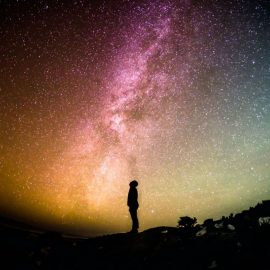
What makes Darwin’s theory of evolution so revolutionary beyond its biological implications? How does understanding evolution change our perspective on human consciousness, culture, and morality?
In Darwin’s Dangerous Idea, Daniel Dennett explores how evolutionary theory transforms our understanding of life, consciousness, and human nature. He demonstrates that Darwin’s concept of natural selection extends far beyond biology, reshaping our views on everything from religious beliefs to cultural development.
Keep reading to discover how Dennett reveals the profound ways evolutionary thinking illuminates the mysteries of human existence and challenges traditional beliefs about our place in the universe.
Overview of Darwin’s Dangerous Idea (Daniel Dennett)
In Darwin’s Dangerous Idea, Daniel Dennett explores the far-reaching implications of Charles Darwin’s theory of evolution by natural selection. Dennett argues that Darwin’s theory isn’t merely a biological theory—it’s one that has sent shockwaves across philosophy, psychology, religion, and culture. According to Dennett, evolution by natural selection can explain the emergence of complex design without the need for a “designer” or God. Building on this concept, Dennett applies it to the development of human minds, culture, and even our notions of morality and consciousness.
In this overview, we’ll explore the key themes in Dennett’s book, including:
- That evolution is an algorithmic process of random mutation and natural selection that’s unguided by an intelligence, purpose, or conscious design
- How the algorithmic nature of evolution challenges traditional religious and philosophical teachings by eliminating the need for a divine creator to explain the complexity of the natural world and by undercutting the idea of a central or anointed place for humankind
- The implications of evolution on our understanding of human thought, language, culture, morality, and free will
Part 1: The Algorithmic Process of Evolution
Dennett writes that one of the most controversial Darwinian principles is that the natural world emerged not through intentional design but through an algorithmic process—a set of rules that follow scientific or mathematical principles.
One example of an algorithmic process that occurs in nature is how a river shapes a landscape. Imagine a vast, flat plain with a river running through it. The river doesn’t have a “mind” or a “plan,” but it follows simple “rules” or steps based on physics: As the water flows downhill, parts of the river where the water runs fast will erode more soil, and parts where the water flows slowly will deposit sediment. These simple rules, acting over thousands of years, can transform a landscape into something complex and beautiful, like the Grand Canyon.
Dennett argues that evolution likewise unfolds according to an algorithmic process. The steps of the evolutionary algorithm, when repeated for millions of years, produce the diversity and complexity of life we see around us—without needing a conscious designer to guide the process.
Next, we’ll explore the two key steps of the evolutionary process: random mutation and natural selection.
Step #1: Random Mutation
Random mutation, writes Dennett, is a series of unplanned, undirected changes in genetic material. These mutations occur spontaneously during DNA replication or as a result of environmental factors like radiation or chemical exposure. Random mutations can lead to changes in the physical characteristics (known as the phenotype) of an organism, such as differences in appearance, structure, or the function of body parts.
According to Dennett, these changes are not guided by any intelligence or purpose; instead, they happen purely by chance.
Most Mutations Are Insignificant or Harmful
Dennett notes that most mutations don’t lead to improved features or enhanced survival capabilities. In fact, he writes, the vast majority of mutations either have no discernible impact at all or tend to corrupt or degrade features rather than improve them—resulting in malfunctions or abnormalities that can be detrimental to an organism’s survival chances. Dennett emphasizes that only a very small percentage of mutations result in beneficial changes that enhance an organism’s genetic fitness for survival and reproduction and therefore get passed on.
Step #2: Natural Selection
Dennett writes that the second part of the evolutionary algorithm is natural selection. Organisms with beneficial mutations have an increased chance of surviving long enough to reproduce and pass those same advantageous traits onto their offspring. Over generations, these beneficial traits become more common within the population.
The Role of Environmental Pressure
According to Dennett, the environment in which organisms live largely determines which mutations are beneficial (and thus more likely to get passed on) and which aren’t. This is because different environments present different challenges and opportunities with respect to climate, food availability, predators, and competition for resources. Organisms with mutations that happen to be advantageous in their specific environment are more likely to survive and reproduce.
For example, imagine a population of wild, brown rabbits that evolves a mutation causing their fur to turn white in the winter. If these rabbits live in an area with snowy winters, this mutation will help them blend in during those months. Because it helps them survive, the mutation will be passed down to future generations. However, if this mutation appeared in a population of rabbits from a region where it doesn’t snow in the winter, it would not afford them the same survival advantage. Instead, it would make them more visible to predators during winter months and thus less likely to survive and pass the mutation on to subsequent generations.
Part 2: How Darwinism Challenges Traditional Dogmas
Now that we understand the basic mechanics of the algorithmic process of evolution, we can explore why Dennett writes that these ideas challenge traditional religious and philosophical dogmas. Indeed, Dennett writes that the impact of Darwinism has extended far beyond biology, fundamentally reshaping all intellectual and philosophical frameworks that existed before it.
We’ll explore how the idea of evolution removes the role of a creator or God from the natural world’s origins and challenges teleology—the doctrine that the natural world was created with some goal or purpose. We’ll also explore the ever-changing character of the observable universe and the highly contingent nature of human existence.
The Loss of a Creator
Dennett writes that the process of evolution, which as we’ve seen is guided by an unthinking algorithmic process, eliminates the need to attribute the complexity and diversity of life to a god or creator. This, he argues, directly threatens traditional dogmas.
Complexity Can Arise From Simplicity
Before Darwin, writes Dennett, most scientists used the argument from design to explain our world. This argument holds that the complexity and beauty of nature could not have happened accidentally; instead, it’s evidence of a deliberate “designer”—God, in the Judeo-Christian tradition—who is even more complex than life itself.
But, according to Dennett, evolution demonstrates how complexity can arise from simplicity through cumulative changes over time. Starting from simple self-reproducing entities (like single-cell organisms), 1) random mutations create slight variations, 2) environmental pressures favor certain variations over others, and 3) beneficial changes accumulate over many generations. Over billions of years, countless iterations of this algorithmic process can produce highly complex organisms and systems. Dennett argues that our understanding of evolution as a bottom-up process that results in complexity contradicts creator-centric dogmas, which are top-down.
The Absence of Teleology
Teleological thinking holds that there’s a purpose behind everything in the observable universe, such that every element of nature, from the smallest particle to the largest galaxy, exists for a reason and serves a particular function. Teleology is a cornerstone of many religious traditions, which argue that if everything was created for a reason, then an intelligent entity or divine will must have designed creation carefully, giving everything the capacity to fulfill its purpose. For example, a teleological view might hold that God gave birds wings “for” the purpose of flight and made trees produce oxygen “for” animals to breathe.
However, writes Dennett, Darwinism posits the opposite. Under Darwinism, there’s no teleology to the natural world—no design, purpose, goal, or objective that guides processes or phenomena. Instead, features like bird’s wings or trees’ oxygen production developed through algorithmic processes of random mutation and survival-driven adaptation.
The Natural World Is in a State of Flux
Dennett argues that the theory of natural selection challenges traditional thought by positing that the natural world is in a constant state of flux. He notes that this stands in stark contrast to millennia of Western philosophical and religious traditions, which often sought to identify eternal truths and immutable forms in nature.
For example, the prevailing belief used to be that each species has immutable “essences.” According to this belief, the camel species has always been a camel species because it possessed certain “essential” characteristics—such as humps—even though there might be differences between individual camels. Dennett writes that Darwin challenged and ultimately discredited this belief by proposing that species change over time. Thus, instead of having some eternal “essence,” camels as we observe them today had a fixed beginning point at which they acquired their so-called “essence.”
Our Existence Is a Matter of Chance
Dennett writes that humanity’s existence as we know it was not inevitable or preordained. Just as there’s no “purpose” of a bird’s beak or a butterfly’s wings, humans were not created “for” some purpose, and our existence doesn’t represent the ultimate goal or aim of the evolutionary process.
Indeed, human evolution, like all evolution, is a process driven by random mutations and natural selection. Thus, our specific anatomy—and even, as we’ll see, our unique form of intelligence and consciousness—represents just one possible outcome among a near-infinite number of hypothetical alternatives. It’s possible that we might have become an evolutionary dead end long ago if not for some fortunate mutations along the way.
Dennett cites the argument of evolutionary biologist Stephen Jay Gould, who observes that if we were to travel back in time and set the course of human evolution back to the beginning, the outcome would be radically different. It’s extremely unlikely that humans would ever evolve exactly the same way again.
Part 3: What Darwinism Says About Our Humanity
Dennett writes that the logic and implications of Darwinian thought challenge our beliefs about our most elemental human characteristics. We’ll examine how the theory of evolution influences our understanding of human culture, morality, and free will.
The Role of Evolution in Culture
Dennett writes that evolution offers an intriguing explanation for humankind’s unique culture and achievements. According to Dennett, the Darwinian principles that drive biological evolution can also be applied to cultural evolution. Just as genes propagate through biological replication, Dennett posits that “memes” (a term coined by Richard Dawkins in The Selfish Gene) are units of cultural transmission.
Memes spread through the selective adoption and transmission of ideas, behaviors, and thought patterns. Just as with genes, some memes replicate successfully while others don’t; some even mutate into forms that increase their transmissibility. This is because certain characteristics enhance their survival and replication chances, similar to genetic fitness.
This memetic evolution, Dennett argues, is the engine behind humanity’s unique cultural capabilities. Our ability to pass on knowledge, overcome physical limitations, and consciously shape our individual and collective futures can be understood as the product of memes replicating, mutating, and being selected for within human societies.
For example, the blues originated in African-American communities in the United States and were then incorporated into various other genres like rock, jazz, and pop music. This mutation—or adaptation to new environments—increased the style’s transmissibility by making it appealing to a wider audience.
The Evolutionary Roots of Morality
Dennett writes that just as culture can be understood as an evolution of memes, so can morality: Our understanding of right and wrong, ethics, and altruism aren’t divine gifts but are instead transmitted culturally. We learn these behaviors from those around us, absorbing them as part of our cultural upbringing.
Dennett writes that an evolutionary or memetic explanation for our moral systems can be traced back to reciprocity: the practice of exchanging actions, goods, or services with others for mutual benefit. It’s a fundamental social behavior where individuals cooperate and help each other with the expectation that such actions will be returned in kind.
In early human societies, reciprocity might have manifested in the sharing of food after a successful hunt. For example, a skilled hunter who brought down a large animal would share the meat with others in the group, knowing that when he failed to catch prey in the future, those same individuals would share their own successful hunts with him. This mutual exchange ensured a more consistent food supply for everyone, increasing the entire group’s chances of survival.
From this foundation of mutual exchange and benefit, more intricate moral concepts like fairness, trust, and cooperation gradually emerged. Dennett posits that successful moral ideas formed memes that spread and evolved within cultures much like genes do in biological evolution. He further writes that this perspective helps explain the diversity of moral systems across different cultures, as these ideas would have evolved differently in varying cultural contexts—just as, as we’ve explored, environmental pressures in the physical environment influence which genetic mutations survive and which don’t.
Darwinism and Free Will
Dennett doesn’t view this memetic understanding of human cognition as negating free will or individual autonomy. He argues instead that individuals play an active role in choosing which memes they absorb and adopt. We’re not passive receptacles for cultural information—we’re active participants in selecting, interpreting, and integrating memes into our worldview. Once absorbed, the memes don’t simply control us. We process them, combine them with other ideas, and apply them in novel ways. This process, he writes, is a form of individual agency.






